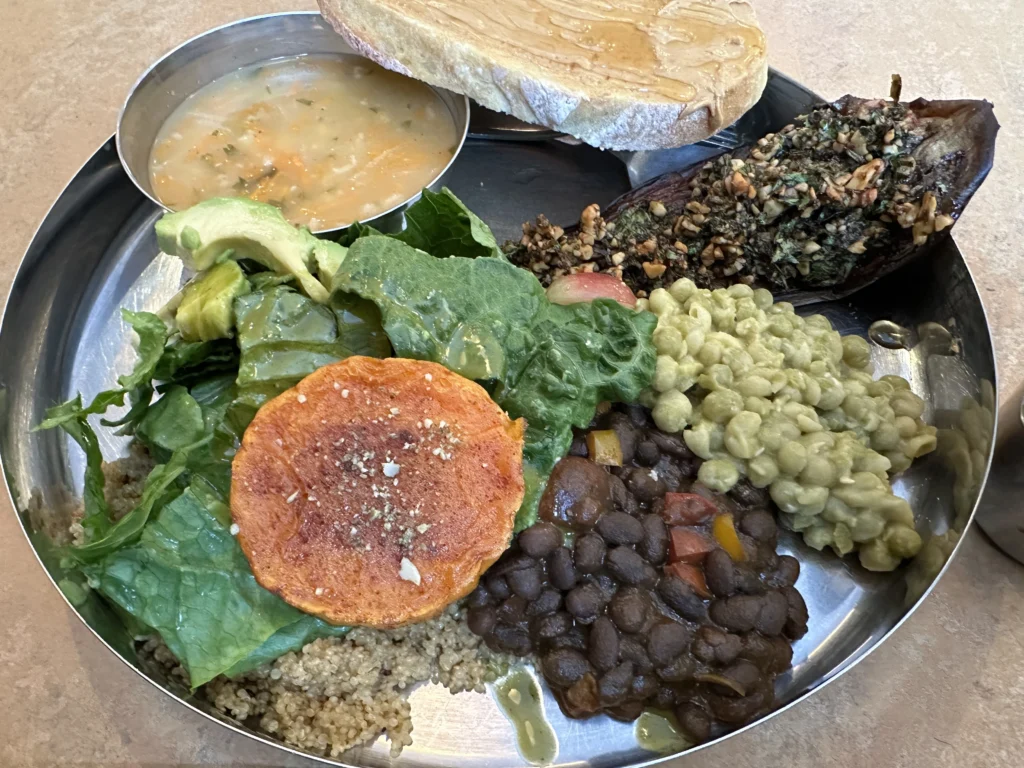About Vegetarian Diet:
A vegetarian diet centers around plant-based foods, excluding meat, poultry, and often seafood, while emphasizing fruits, vegetables, grains, legumes, nuts, and seeds. This dietary choice can be motivated by various reasons including health benefits, ethical considerations for animal welfare, environmental sustainability, or religious beliefs.

Vegetarians tend to have lower risks of heart disease, hypertension, diabetes, and certain cancers due to the high intake of fiber, antioxidants, and nutrients like potassium and magnesium. Moreover, plant-based diets are known for their lower environmental impact, requiring less water, land, and energy to produce compared to meat-based diets.
Careful planning is necessary to ensure adequate intake of vitamin B12, iron, calcium, and omega-3 fatty acids, nutrients more commonly found in animal products. With the rise in awareness about health and environmental issues, vegetarianism continues to grow in popularity, offering a diverse and flavorful approach to eating that celebrates the bounty of the earth.
Health-wise, a well-planned vegetarian diet can provide numerous health benefits, including lower risks of heart disease, high blood pressure, type 2 diabetes, and certain cancers, due to its typically higher intake of vegetables, fruits, grains, legumes, nuts, and seeds which are rich in essential nutrients like fiber, vitamins, and minerals.
Environmentally, vegetarianism can reduce one’s carbon footprint since animal agriculture is a significant contributor to greenhouse gases, deforestation, and water usage. Culturally and religiously, vegetarianism has been practiced for centuries in various forms; for example, in Jainism, Hinduism, and Buddhism, where non-violence towards all living beings is a core principle.
5 Key Health Benefits of Vegetarian Diet:
- Health Benefits: Lower risk of heart disease, hypertension, type 2 diabetes, and certain cancers due to a diet rich in fiber, vitamins, and antioxidants.
- Weight Management: Plant-based diets are often lower in calories and saturated fats, aiding in weight control and maintenance.
- Digestive Health: Increased intake of fiber can lead to better digestive health, preventing constipation and promoting gut health.
- Disease Prevention: Lower levels of cholesterol and blood pressure, contributing to a reduced risk of chronic diseases.
- Nutritional Diversity: Exposure to a wider variety of nutrients from different plant sources, potentially leading to a more balanced diet.
Myths about Vegetarian:
There are several myths that surrounds vegetarianism and vegetarian diet. A common belief is that plant-based diet cannot supplement enough nutritional value required for the body. A good vegetarian diet includes legumes, grains, seeds and nuts which provide enough fibre, protien, vitamins and healthy fat for the body. A Lacto or Lacto-Ovo vergetarian person gets more calcium and other nutrients from eggs and dairy products that may strengthen the Bones.
Benefits of Vegetarian diet:
Human body breaks down food to digest and make it part of our body. Studies have shown that plant-based food is less complex to break down compared to meat and can absorb easily into the body.

The digestion process for plant-based food can take around 8 to 12 hours whereas the meat-based diet can go around 18 to 24 hours. The longer duration for the digestion of food in the intestine may cause build-up of bacteria in the gut and may upset stomach and can eventually lead to illnesses.
A healthy diet is significant to keep the body, mind and spirit at its optimum. Plant-based foods are less complex for the human body to breakdown and digest and the meat products are more complex and therefore cause a delay to digest and expel the waste out of the body.
The roots of Vegetarianism spread across different cultures and civilizations from ancient India to Greece. The practice of vegetarianism dates back in India from the Vedic period. Ayurveda, the ancient science of life describes the health and wellness of our body which recommends a balanced-diet, healthy body and mind.
Vegetarian recipes:
Preparing a balanced vegetarian-diet is key to vegetarianism. Tasty traditional and contemporary vegetarian recipes are easy to prepare using fresh or dry food produce. From healthy sandwich, soups, pizzas or curry, a wide range of healthy options are available for vegetarians.

maximizing the consumption of positive pranic foods in our diet such as fruits, nuts, and seeds enhances the vital life energy in our body. Choosing proper food for our diet helps to maintains a healthy body but also build a sustainable eco system for our planet.
Popular Vegetarian Dishes to try:
- Mixed Vegetable Soup – Usually served with bread or plain rice with yogurt.
- Mixed Vegetable fried rice
- Mixed Vegetable noodles
- Vegetarian Tacos
- Lental soup – served with bread
- Baked Paneer with spice rub – served with bread like Naan, Roti or rice
- Vegetarian pasta or Lasagna
Embracing a vegetarian diet can yield numerous health and environmental benefits. From a health perspective, it’s associated with lower risks of heart disease, hypertension, type 2 diabetes, and certain cancers due to its high content of fiber, antioxidants, and essential nutrients while being low in saturated fats.
Vegetarian diets have a lighter footprint, reducing greenhouse gas emissions, water usage, and land use compared to meat-centric diets. Moreover, this dietary choice promotes ethical considerations by reducing animal suffering. Adopting a vegetarian lifestyle supports personal well-being, contributes to planetary health, and fosters a more compassionate world.